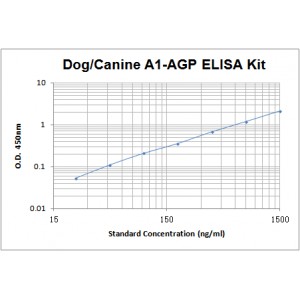More info
Assay Range | 23.4-1500 ng/ml |
Sensitivity | 1.0 ng/ml |
Specificity | No cross-reaction with other related substances detected |
Size | 96T |
Storage | Store at 2 - 8ºC. Keep reconstituted standard and detection Ab at -20 ºC |
Assay Principle | Sandwich ELISA |
Sample Volume | 100 µL final volume, dilution factor varies on samples |
Sample Type | serum, plasma, body fluids, tissue lysate or cell culture supernatant. |
Detection Method | Chromogenic |
Kit Components
1. Recombinant Canine A1-AGP standard: 2 vials
2. One 96-well plate coated with Canine A1-AGP Ab
3. Sample diluent buffer: 12 mL - 1
4. Detection antibody: 1 vial
5. Antibody diluent buffer: 12 mL x1
6. Chromogenic solution A: 6 mlx1
7. Chromogenic solution B: 6 mlx1
8. Stop solution: 6 mL x1
9. Washing solution (20x): 25 mL x1
Background
Alpha-1-acid glycoprotein (AGP), also known as orosomucoid (ORM), α1AGp or AAG, is a 183 amino acid highly glycosylated (45%) protein with a moleculr weight of 41 KD. It is an acute-phase plasma glycoprotein synthesized in the liver and secreted into the plasma. In response to acute infections or inflammation, the plasma concentration of AGP increases considerably. The elevated serum level of AGP is associated with an increased risk of cardiovascular disease. It is reported that urinary AGP excretion rate predicts cardiovascular mortality in patients with Type II diabetes. AGP can be used as a marker for acute inflammation, chronic alcohol drinking, chronic kidney disease and asthma.


